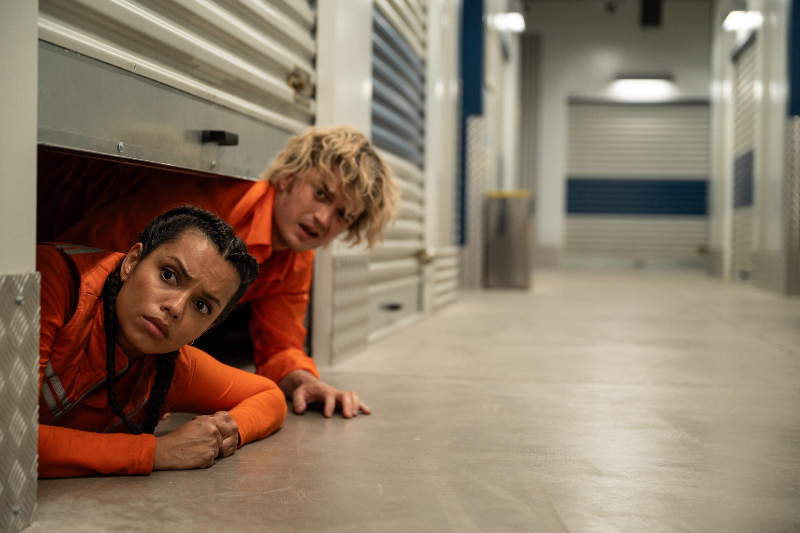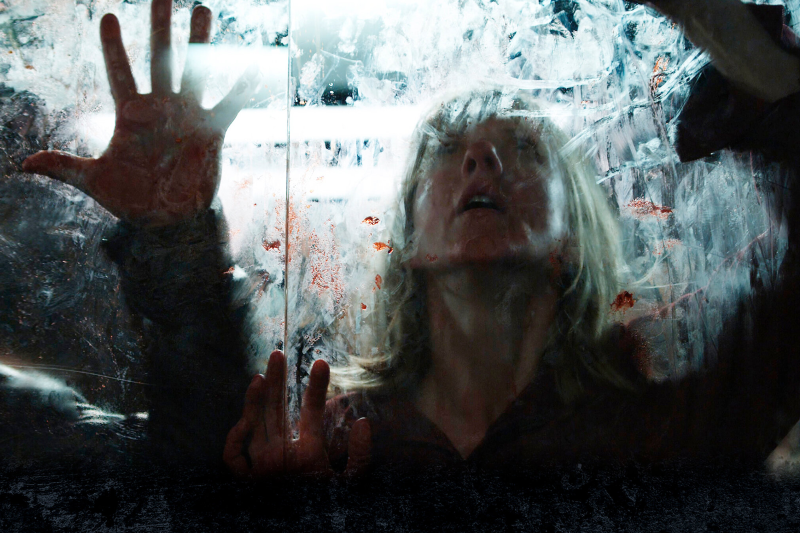You’ve probably seen it on Twitter or Instagram at some point in the last several years: a photo of a woman smiling mischievously in the ending shot of a film, with the words “Good for Her” emblazoned over her head. Amy from Gone Girl. Carrie. Dani from Midsommar.
As they usually do, the “Good for Her” meme has grown to encompass a broad, often contradictory plethora of female characters from horror cinema and beyond. If you ask some people, the Good for Her Cinematic Universe (GFHCU) includes every and any female character who has done something vaguely satisfying over the course of a film. I, however, am going to be pedantic and posit a theory: not every triumphant female character should be included in the GFHCU canon. This is specifically due to the transgressive nature of the characters who embody the meme that make their choices so deeply satisfying. A real Good for Her woman satiates a part of our lizard brain that screams out for a specific kind of revenge, a righting of the world that society at large cannot condone.
The meme originated as a phrase from Arrested Development, wherein Lucille Bluth uttered the infamous words in praise of a mother who became so overwhelmed that she allowed a car full of children to roll into a lake — which just goes to show that the phrase, as memed, has always had a subversive edge to it. It’s not merely about women doing well or overcoming adversity, it’s about “bad” women finding their bliss in socially-unacceptable ways.
She isn’t the one you’re normally encouraged to root for, and she’s different from the final girl, who’s all next-door charm and morality embodied. She’s most likely looked down upon or feared by her contemporaries, and is often considered the villain of the story. A true Good for Her character is a person who:
- Identifies as female.
- Is an underdog or villain for most of the film.
- Triumphs over the status quo by asserting agency over her own body, almost always by unleashing the scariest and most monstrous thing of all: her sexuality.
Take Robert Eggers’ The Witch (2015), one of the first horror films to gather steam under the Good for Her meme. In the film, teenaged Thomasin and her family are banished from their Puritan colony due to religious disagreements and forced to make it on their own in the wilderness. “Suffer now, summit later” could be the family slogan, and life on Earth is a real slog when you have only the slim hope of a happier afterlife to keep everyone going. The farm isn’t doing well, crops aren’t growing abundantly enough to ensure the family will make it through the winter … and that’s all before a witch steals little baby Samuel right from under Thomasin’s nose, when things really start to get grim.
The family quickly falls into the habit of blaming Thomasin for every mounting misfortune. As the only young woman for miles, Thomasin’s very body is considered a sign of depravity. Thomasin is regarded with suspicion even before the baby disappears under her watch; she’s also seen as a tool of seduction by her mother and a shameful temptation by her brother. Afterwards, things get much worse. The family’s most valuable possession, a silver cup, goes missing and her mother blames her. The twins forget their holy prayers and claim it was Thomasin’s evil doing.
After spending the bulk of the film accused of witchcraft, seduction, murder, and every other imaginable sin, it’s little wonder Thomasin chooses to become a witch herself when she’s finally presented the opportunity. “Wouldst thou like the taste of butter? A pretty dress? Wouldst thou like to live deliciously?”
The answer is yes, she would.
In doing so, of course, Thomasin signs her soul over to the Devil and accepts some fairly dicey practices. She is making an obviously immoral choice (dead baby is a key ingredient in flying ointment, after all), and yet the audience can’t help but feel vicarious gratification at seeing this trod-upon character find some form of happiness at last. Thomasin’s decision to eschew all that society has told her — that her only path to salvation is through a lifetime of drudgery — is unexpected, and all the more delicious, because it is “wrong.” A woman is never allowed to choose herself, her own desires or happiness, over the good of anyone else.
But Thomasin does. She chooses pleasure for herself, now, in this life, no matter how fleeting. By making the unacceptable choice, Thomasin sheds all societal expectations — and all the shame and guilt that has been heaped upon her simply for being born a woman. She sheds her clothes and all the trappings of civilized society, and she becomes liberated, god-like — and we in the audience feel liberated as well. The film ends with Thomasin walking naked and unafraid through the woods, approaching her new coven of witches, ready to soar.
Now compare The Witch’s ending to that of another movie that’s oft-cited as a Good for Her film: Promising Young Woman (2020). Cassie is a depressed and jaded med school dropout who — still reeling years later from the trauma of her best friend, Nina, committing suicide after she was raped by a classmate — spends much of her time trolling bars and pretending to be drunk. When an unsuspecting man takes her home and attempts to rape her, Cassie reveals she’s not actually drunk at all, giving the man the scare of his life. It serves as a warning: be careful who you try to take advantage of.
When Cassie attempts to exact revenge on the men who raped Nina, however, everything goes sideways, and she is murdered. From beyond the grave (and through the miracle of scheduled texts), she delivers one last punch by sending evidence of Nina’s rape and her own murder to the police. It’s poetic in its justice, if Greek in the scope of its tragedy. So why doesn’t the ending feel more fulfilling?
Recall factor three of the Good for Her criteria: Cassie is ultimately unable to assert agency over her body, which is literally overtaken, and thus she is unable to carry out her plan and upset the status quo. Cassie attempts to work outside the system, first through her bar patrols and later by infiltrating Nina’s rapist’s bachelor party, because she knows that the system society has set up doesn’t work; rape victims rarely get justice and the majority of rapists go unpunished. But when her plan to force a confession and physically punish Nina’s rapist fails, she’s left with no option but to deploy a last-ditch effort, appealing to the justice system with undeniable evidence of her own murder. Of course, she has to die in order to gather such evidence.
That’s the problem: Cassie is reduced to working within a system that has been rigged against her the entire time. There’s no promise the rapists and murderers in the film will be punished, or punished adequately — statistically, it’s almost guaranteed that they won’t. It is achingly sad and all too real. There’s no feeling of mischievous glee after Cassie dies, even when we realize there’s more to her revenge scheme; we’re merely resigned to the fact that a few crumbs of retribution, doled out posthumously no less, are all women can hope for in a world that doesn’t care about or believe us. It’s a great film, a necessary film — but there’s none of the wicked escapism inherent in a true Good for Her film.
There are plenty of other films I would nominate for the GFHCU, but they all have a common thread: a woman’s empowerment, at any cost. For example, in CAM (2018), a woman manages to defeat an imposter who’s taken over her online persona, despite an utter lack of understanding or help from the police. In the end, instead of being cowed into a different career, the woman bravely adopts a new persona and continues on her chosen path. The Good for Her moment is not in overcoming a villain within the camming world, it’s in choosing to go back to camming despite a society that refuses to recognize that as a choice that could be good, let alone empowering, for anyone. It’s in her transgression that she finds freedom.
Society is terrified of women, and a woman who realizes the power inherent in embracing her desires — rules of polite society be damned — is the most terrifying thing of all. We’re scared of these women, and yet so many of us also secretly wish to be them. We see their stories onscreen and feel drawn to their perspective because it mirrors a shadowy piece of our own. We watch them commit heinous, unforgivable crimes and can’t help but mutter a single phrase under our breath:
“Good for her.”






